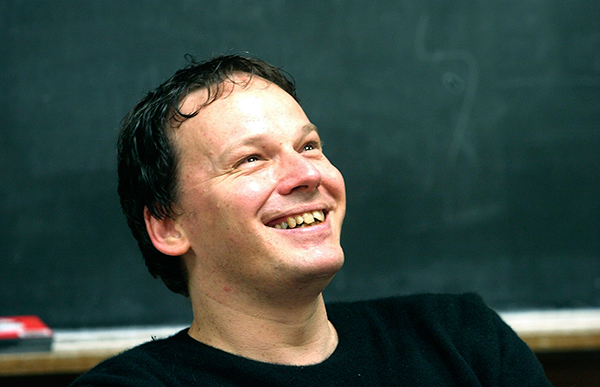A Reflection Occasioned by the Death of Anarchist Anthropologist David Graeber
Struggles, Principles, Unity, and the Challenges Ahead
| revcom.us
David Graeber was an outspoken critic of the howling inequalities of U.S. society and the world. He was instrumental in coining the watchword of the Occupy movement, “We are the 99%.” From an anarchist perspective, he sought to put scholarship in the service of justice and change, especially with a study of “Debt,” historically as both an instrument and manifestation of exploitation and oppression.
David Graeber died in early September. We mourn his passing.
David Graeber did his early research on magic, slavery, and politics. He explored and condemned how the toxic union of capitalism and advanced technology robbed human beings of meaningful work and moral and spiritual purpose. Inspired and moved into political life by the anti-globalization struggles of the late 1990s, Graeber threw himself into the maelstrom of important political struggles, most significantly Occupy Wall Street, for which he was a major—and leading*—theorist. Refused tenure by Yale University, a decision that sparked outrage and protest among progressive people, he eventually found an academic home in Europe.
Occupy Wall Street took place in 2011. It involved thousands of people in scores of cities in sustained, militant protest against inequality. Occupy broke open a stultifying political atmosphere and inspired people all over before being crushed by coordinated repression by the ruling class after several months of protest encampments.
As Bob Avakian commented in the early days of Occupy, in his statement, A REFLECTION ON THE “OCCUPY” MOVEMENT: AN INSPIRING BEGINNING...AND THE NEED TO GO FURTHER:
The main—and, up to this point at least, the overwhelming—aspect of these "Occupy" protests has been their very positive thrust: in mobilizing people to stand up against injustice and inequality and the domination of economic, social and political life, and international relations, by a super-rich elite class whose interests are in opposition to those of the great majority of people; and in contributing in significant ways to an atmosphere in which people are raising and wrangling with big questions about the state of society and the world and whether and how something much better can be brought into being.
At the same time, as Bob Avakian analyzed in his statement, while Occupy inspired millions to stand up against the ruling class and raise their heads and question, it was ultimately constrained by and further cemented frameworks, theoretical structures of analysis, and approach that:
[do] not and cannot measure up to the reality of what is actually required to fundamentally uproot and transform a society, and indeed a world, marked by and grounded in profound inequalities and relations of oppression and exploitation, within every country and in the domination by a handful of powerful, imperial powers over the great majority of countries in the world and the great mass of humanity.
As one example, Graeber himself, in Fragments of an Anarchist Anthropology, took issue with the idea of a “revolution,” as the actual overthrow of the system of capitalism-imperialism, instead calling forth the continual accumulation of resistance and counter-community within the current system, such as the development of autonomous zones. In 2012, even while learning from some of his insights and research, we wrote a short and sharp polemic on the problems with Graeber’s perspective and reading of history (“Four Questions for David Graeber”). To get to a radically different and far better world requires the revolutionary overthrow of the capitalist-imperialist state power. It requires the creation of a new state power and liberatory, planned socialist economy that enable oppressed humanity to go to work on uprooting exploitation, oppression, and inequality and protecting the planet—as part of a world process of the emancipation of all of humanity. This is necessary, this is desirable, and this is viable.1
But these were differences between people on the same side of the barricades, so to speak. One thing that marked David Graeber was his openness to other points of view, to disagreement and debate, and our engagements and struggle were principled, grounded in standing with the exploited, and in unity against the oppressive powers that be.
Humanity confronts an existential moment, with howling inequalities intensifying with the global pandemic, a rapidly warming planet, and fascism in ascendance globally, including here in the U.S. If ever there was a time for radical intellectuals and youth, for those like or inspired by David Graeber, to sound the alarm, to bring light and conviction and help galvanize and unite millions, including right NOW in the struggle to oust this fascist regime... it is NOW. And as we join and fight together, let’s have robust and principled debate. This is about the future of humanity and the planet.
In memoriam, David Graeber!
* Leadership is a highly contested notion in anarchist circles. But as has been recognized by a number of anarchists themselves in writing about David Graeber, including, for example in the New York Review of Books compilation, he was one of the main intellectual architects of the vision, program, and framework of Occupy, and of other anarchist struggles. This is objectively leadership—through line—through putting forth and winning others to an analysis of reality, of what is the problem and what is the solution, of what is to be done. [back]
Despite this, and in fact, Graeber was an advocate of and provided a lot of backing for the idea of “horizontal” movements (as opposed to “hierarchical”), as a means of social change and model of a different society. This is addressed in Bob Avakian’s statement A REFLECTION ON THE "OCCUPY" MOVEMENT: AN INSPIRING BEGINNING...AND THE NEED TO GO FURTHER
1. For more, see Constitution for the New Socialist Republic in North America, and the talk WHY WE NEED AN ACTUAL REVOLUTION AND HOW WE CAN REALLY MAKE REVOLUTION (Part 1 video, Part 2 video, Text) by Bob Avakian. [back]

David Graeber (Photo: AP)
Get a free email subscription to revcom.us:

